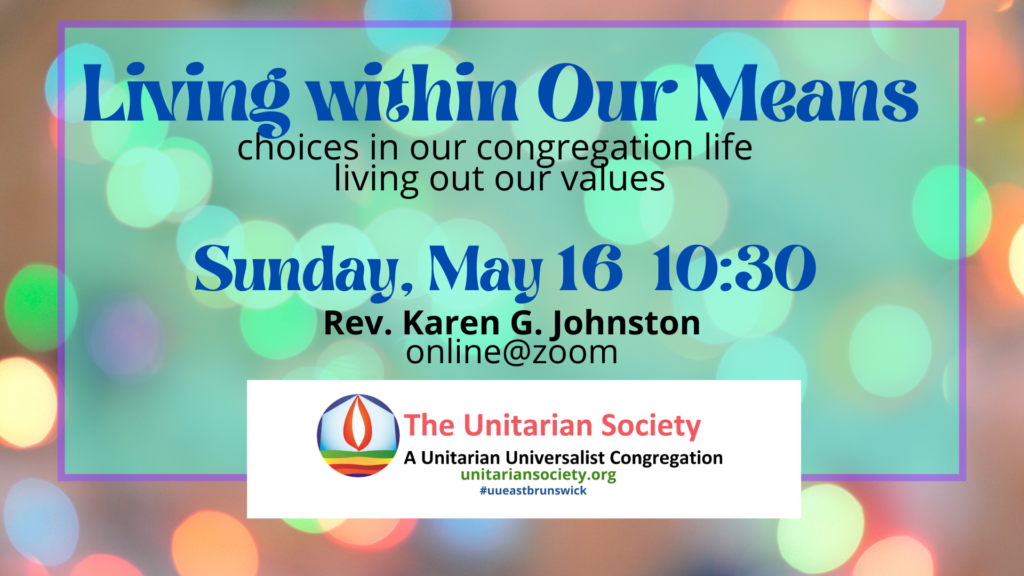The Unitarian Society
East Brunswick, NJ
May 16, 2021
Today, I am here to encourage the congregation as a whole to go boldly into uncertainty; to live boldly within our means; to invest boldly in our future.
Even as the personal and societal winds of scarcity whisper, and sometimes shout, their pernicious persuasion in your ear.
I ask you to engage Rev. Jake’s concluding question: Which trade-off will we make?
***
We are not living within our means when teachers in our school aren’t being paid a living wage. It cannot be on the backs of the staff of the Montessori School that our congregational budget is balanced.
It’s already not right that we don’t help to fund health insurance for our employees except for the Minister (me), though that is far more complex – perhaps even impossible – for us to remedy, except to overhaul the whole damn healthcare system and bring Medicare for All.
It’s not right that we are considering not paying the recommended compensation for guest ministers for the second year in a row, after there was no increase to that standard fee for nine years.
At today’s Annual Meeting, our members are voting on a budget that will remedy the living wage issue for the Montessori School. While the recommended budget has a monetary deficit budget, in this particular sphere, there is no ethical deficit. That is good. Very good.
***
I recently heard someone remark proudly that we haven’t yet touched our Endowment.
This does not fill me with pride. It fills me with worry.
Worry, because I believe that it could be detrimental to leave the Endowment “intact” instead of accessing its abundance to nourish the congregation during and after this long pandemic austerity.
In the five years of our shared ministry, I have found that one of the roles is to remind you of the abundance in your midst: that you own a parsonage outright; that you own a School that brings a profit more years than not; that you have a very healthy Endowment (thank you, Ones Who Went Before Us!) – an Endowment that was made to get us through scarce times not just by looking at it.
Living boldly within our means doesn’t necessarily mean accessing our Endowment abundance. It could be accessing our human labor abundance, such as clearing part of the property to create space to safely meet outside in the wooded oasis that is our grounds, as one lay leader recently dreamed aloud with me.
***

In the early 1980s, I took Driver’s Ed class as part of my high school curriculum. Not sure if it was for credit, but my parents didn’t have to pay for it (like I did when my kids were growing up). I remember there were seatbelts, but only lap belts. I know some of you remember those days.
The name of our Driver’s Ed teacher was Slick. That’s what we were allowed to call him. His nickname matched his slicked back hair so perfectly. I thought he was a wannabe Elvis. I remember learning from him how to navigate curves:
reduce speed before entering the curve
when you reach that point where the car is closest to the inside of the curve line – called the apex, just BEFORE the curve is about to straighten out —
speed up to successfully pull out of the curve
It was counter-intuitive. Go FASTER inside the curve? It didn’t make sense at first. With practice, I experienced the power of following that guidance. I have been wondering if this applies to our current situation.
The pandemic put the brakes on – for everyone – kind of like reducing the speed with which we entered the very curve we were trying to flatten.
Here we are now, soon to exit the too-long pandemic curve. We’ve been driving it longer than any of us hoped we would have too. Or it’s been driving us. We’re tired. We want to put the cruise control on and just coast.
Yet, soon, it’s time to pull out of the curve. How will we choose to do it? Coasting along, losing momentum? Or giving it a bit more gas, so that we can successfully pull out of this doozy of a curve.
So that we can … ease on down, ease on down the road.

***
A lay leader in the Town Hall back in February told those gathered that if every one of our 80-something pledge units were to contribute about $3300, we would meet our annual pledge goal (which doesn’t even cover half of our budget).
I’m thankful to this lay leader for doing the arithmetic. Someone did that once in my home congregation, back when I was a single mom raising two kids. They said it cost some big sounding number, PER KID, to fund the Religious Education program. I was shocked. I had no idea. That information inspired me to increase my pledge, gradually, within my means. So, in that way, it was good to know.
Yet it can also be problematic to know such arithmetic. Not every family could afford to pledge that per-kid-amount. Plus, it’s not just the responsibility of parents to pay for Religious Education; it’s everyone’s.
Similarly, it can be helpful AND problematic to know this congregation’s arithmetic. It’s just not true that each pledge unit has equal responsibility for meeting the budget. Some can afford $3300. Some can afford three times that. And some can afford one-tenth. From each according to their ability, to each according to their needs.
It can be discouraging for those who cannot afford that arithmetic – so much so that it feels like a message that they don’t belong here. Not the intention, but can be the impact. I never, ever, want that message of unwelcome for any of you. I don’t think any of us do.
Here’s another problem with that arithmetic: it continues us on our current path of what is the smallest amount we can squeak by on. The what-we-can-squeak-by-on amount does not nourish our imaginations. It does not strengthen the now-foundation now for the future-congregation.
***
Members AND friends are welcome – invited, encouraged – to attend the Annual Meeting that will be happening after a short break when this worship service is done. All will hear about the extreme challenges the pandemic has brought our congregation and the heroic leadership of the Board, the Finance Committee, the Leadership Development Committee, in fact all the committees, in helping us get through. As a Member, you will get to vote on an imperfect budget given these impossible times.
Should members choose to approve the budget at the Annual Meeting, you will have used your moral imagination to start UMS teachers’ pay at $15/hour, which is an ethical step worth celebrating.
In the coming months, we will face the ethical quandary of what to pay guest ministers. The recommended feels outside of our reach. Yet, if we use our moral imaginations, there is a solution close at hand: we can choose to pay that recommended rate, which would mean fewer guests and more wonderful lay-led services. This, too, is a way to live within our means.
It seems important to mention that it’s possible if we do not pay the recommended rate, some ministers won’t preach for us, which goes back to Rev. Jake’s question: which trade off will we choose?
At the Annual Meeting, you will also hear about the imagined vision, and steps already taken to make it real, of what it will look like when we return to in-person worship services. Our commitment is to do so in a multi-platform, or hybrid, way: allowing folks to sit in the sanctuary and folks to attend online, living into our values of deep and wide inclusivity. In addition to imagination, this plan will take significant financial resources – a chance to accelerate into the curve so that we can successfully pull out of it. A choice to be Kellogg’s, not Post.
I want to thank you in advance for bringing your questions even if they feel obvious (someone else in the room will be wanting the answer to your question, I promise you).
After the meeting is over, I hope you will reach out to individual members of the Board, the Leadership Development Committee, and Finance Committees to thank them for their hard work. It shouldn’t be a thankless job. As you thank them, consider letting them know they have your support to go boldly into uncertainty, because there will be many times in the coming months and years, when they will face challenging situations, choosing one trade-off for another.
Let us live boldly within our means, silencing the whispers of scarcity.
Let us think long and hard what our answer will be to Rev. Jake’s question: shall we be Post Cereal or shall we be Kellogg’s?
